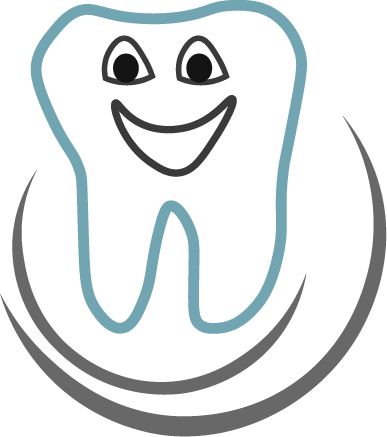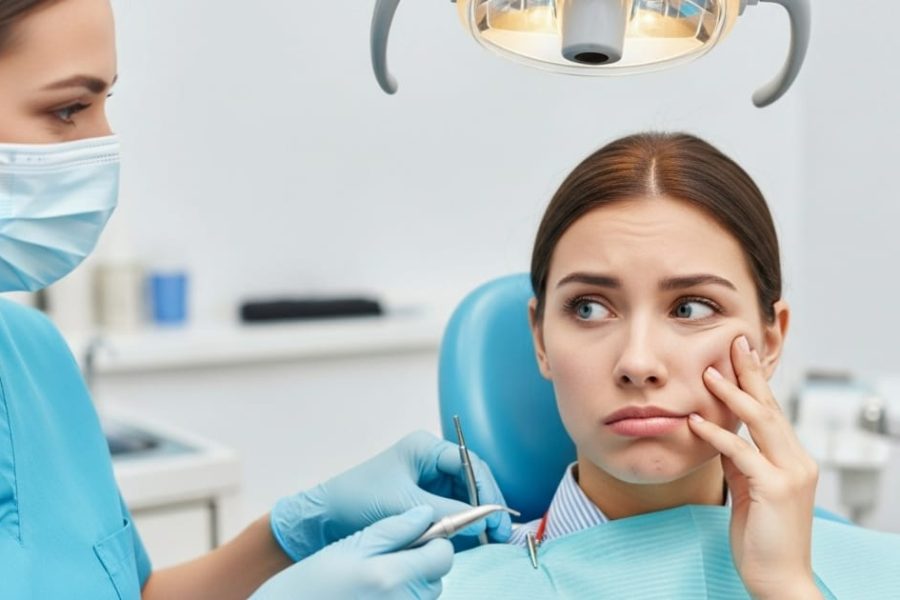For many, the idea of a dental injection is the most anxiety-inducing part of a visit. But once the local anesthetic kicks in, it’s a “game-changer,” ensuring a comfortable, pain-free procedure. However, as the treatment wraps up, the inevitable question pops into your mind: How long until I can feel my face again?
The truth is, there’s no single, fixed answer. The duration of dental numbing varies based on several factors, including the type of anesthetic used, the injection site, and even your metabolism. At Walk-in Dental Clinic, we believe that being informed is the first step to a stress-free dental experience. Here is your comprehensive guide to understanding how long dental numbing lasts and what you can safely expect as your sensation returns.
How Long Is A Typical Dental Numbing Duration?
In general, most local dental anesthetics provide a numbing effect that lasts anywhere from one to four hours. However, the sensation in your teeth often returns faster than the feeling in the surrounding soft tissues (lips, cheeks, and tongue).
| Procedure Type | Expected Numbness Duration (Soft Tissue) |
| Simple Filling / Small Restoration | 1 to 3 hours |
| Crown/Bridge Preparation or Simple Extraction | 2 to 4 hours |
| Root Canal or Surgical Extraction (Wisdom Tooth) | 3 to 6 hours (sometimes longer with specific agents) |
| Deep Cleaning (Scaling & Root Planing) | 1.5 to 3 hours |
Remember, these are general guidelines. The full numbing effect often peaks within the first hour and then gradually fades. Moreover, sometimes the dentist chooses nitrous oxide sedation combined with local anesthetics based on the patient’s needs.
Read More: Tooth Extraction vs. Root Canal: Which One Is Right for You?
Factors That Influence the Dental Numbing Duration
Why does your friend’s numbing wear off in two hours while yours takes four? The duration is highly individualized and is affected by several critical elements:
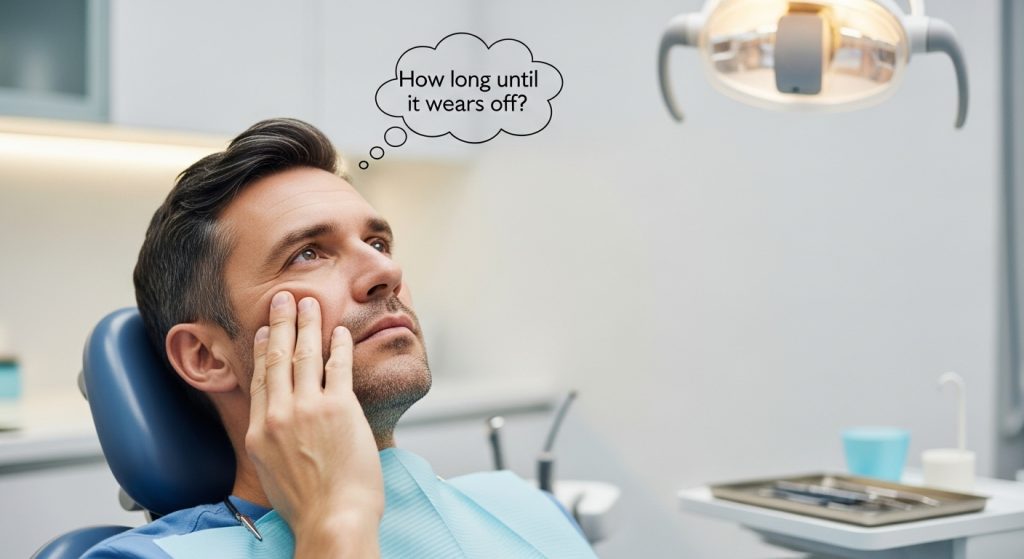
The Type of Anesthetic Used
According to WebMD, different numbing agents are formulated to last for different lengths of time, depending on the needs of the procedure:
- Lidocaine: A very common standard, often lasting 1 to 3 hours.
- Articaine: A popular choice for its quick onset; soft tissue numbness typically lasts 2 to 4 hours, but sometimes less.
- Bupivacaine: A longer-acting agent reserved for more involved surgeries (like complex extractions) where extended post-operative pain relief is desired. Its effects can last 4 to 8 hours.
Presence of a Vasoconstrictor (Epinephrine)
Most local anesthetics contain a small amount of a vasoconstrictor, such as epinephrine (adrenaline). This additive serves two main purposes:
It temporarily constricts blood vessels at the injection site, slowing the rate at which the body’s blood flow carries the anesthetic away to be metabolized. This can extend the dental numbing duration. Moreover, it helps reduce bleeding during the procedure.
The Injection Site and Type
The location in your mouth dramatically affects the duration of dental numbing. Upper Jaw (Maxilla) Anesthetics here generally wear off quicker (1 to 2 hours) because the bone is less dense, allowing the anesthetic to absorb faster. Conversely, numbing the Lower Jaw (Mandible) for lower teeth, particularly the back molars, often involves a “nerve block” near the deeper nerves. The denser bone structure and larger nerve pathways mean the numbing usually lasts longer (2 to 4+ hours).
Read More: How Teeth Are Numbered and Named!
Individual Body Factors
Your body’s unique chemistry plays a significant role. For instance, metabolism is a key factor: Patients with a faster metabolism (often younger or more active individuals) may process and flush the anesthetic out of their system more quickly. The Dosage also matters; a higher dose or concentration, necessary for a longer or more complex treatment, will naturally take longer to wear off.
Finally, your Overall Health can be influential, as certain medical conditions or medications can affect how the body metabolizes the anesthetic. Mental health also plays a role here. For instance, anxiety issues have led to the use of stronger sedation techniques and the introduction of sleep dentistry!
Contact Us for Help!
Worried about the type of anesthesia you will need for your procedure?
Contact us to learn more about the services you need to get your smile back!
What to Expect as the Numbing Wears Off
As your body metabolizes the anesthetic, the numb feeling will begin to fade gradually. This is a positive sign that nerve function is returning to normal!
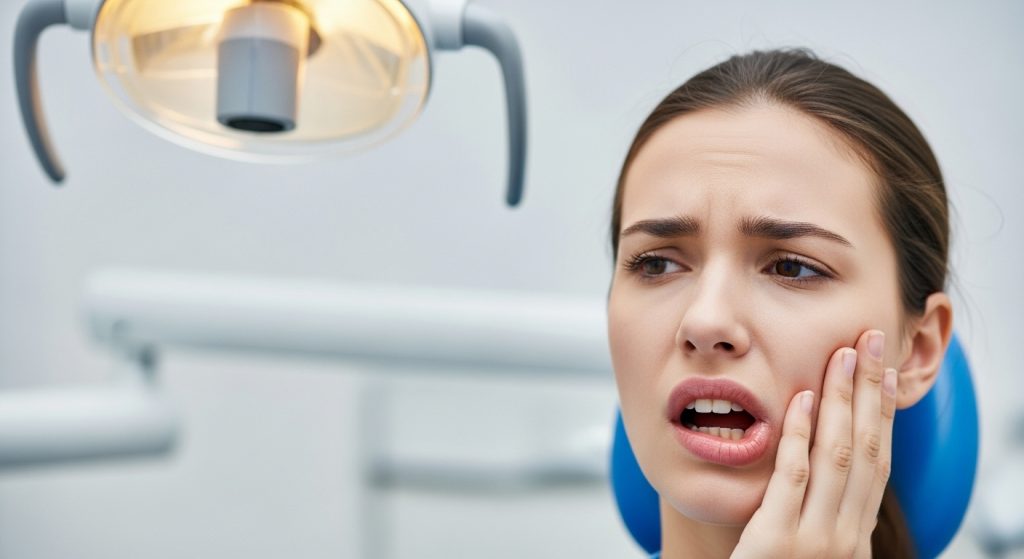
The “Pins and Needles” Sensation:
It is completely normal to feel a tingling or “pins and needles” sensation as the dental numbing duration fades away. This feeling is a sure sign that your sensation is returning. It will subside completely shortly after.
Minor Discomfort and Swelling:
Once the full sensation returns, you may feel some minor pain or discomfort, especially if you had an invasive procedure like an extraction or root canal. This is where you should begin to use any prescribed or over-the-counter pain medication as advised by your dentist. Slight swelling at the injection site is also possible and typically minor.
Essential Aftercare Tips While Numb
While being numb helps with comfort during the procedure, it requires vigilance immediately afterward to prevent accidental injury.
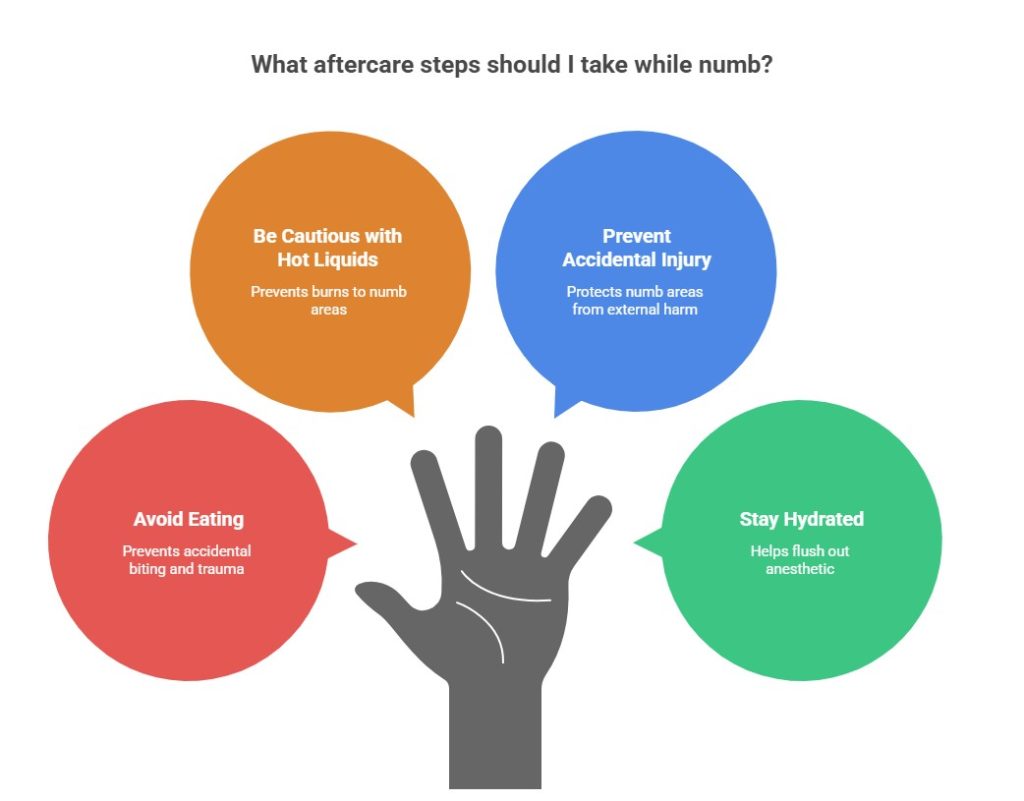
Avoid Eating Until Sensation Returns
This is the single most important rule! You cannot accurately sense pressure, temperature, or the position of your soft tissues while numb. You could accidentally chew on your cheek, lip, or tongue, causing painful trauma that won’t be noticed until the anesthetic wears off. Stick to soft, cool foods like yogurt, applesauce, or a smoothie until all feeling is back.
Be Cautious with Hot Liquids
Since you can’t feel temperature in the numb area, drinking coffee or soup could cause a serious burn to your lips, cheek, or tongue without you realizing it. Wait until your mouth is completely back to normal before consuming anything hot.
Prevent Accidental Injury
Be mindful of your numb area. If you have young children, watch them closely; kids often chew or play with a numb lip or tongue out of curiosity, which can lead to injury.
Stay Hydrated
Drinking plenty of water is always good, as it helps your body flush the anesthetic out of your system and reduces the duration of dental numbness more efficiently.
Comfort Yourself While Waiting Out the Dental Numbing Duration
Here are some gentle self-care tips you can use as you wait for the sensation to return.
Gently massage your lips, cheeks, and jaw from the outside to stimulate blood flow and help the anesthetic clear faster. You can also apply a warm compress to the side of your face to promote circulation, but only if you have no swelling or if your dentist has not advised against heat.
Remember to stay well hydrated and avoid alcohol or caffeine for a while, as good circulation helps your system normalize. Finally, take it easy and avoid strenuous physical activity until the numbness is completely gone and you are confident in your ability to eat and drink without accidental injury safely.
When Should You Call Your Dentist?
While prolonged numbness is rare, it is essential to know when to seek professional advice.
Contact your dentist or book an emergency visit if you experience any of the following:
- Numbness persists beyond 6 to 8 hours (especially if a shorter-acting anesthetic was used for a simple procedure). While some long-acting agents can last this long, excessive lingering numbness may indicate minor nerve irritation, which should be checked.
- Worsening pain, swelling, or signs of infection (like fever or a tooth abscess) after the numbness has fully worn off.
- Severe, unexpected side effects such as a rash, hives, or difficulty breathing could indicate a rare allergic reaction. Abnormal bleeding after tooth extraction, which could suggest tissue damage.
Embrace the Tingles Through Your Journey Back to Normal!
The temporary numbness from a dental procedure is a small trade-off for a completely pain-free experience. While you may feel a little “heavy-lipped” for a few hours, understanding the process and following simple aftercare steps are key to a smooth recovery. Patience is your best tool. Rest assured that the feeling will return, and soon you will be back to enjoying all your favourite activities.
FAQ
Can I drive after receiving dental numbing?
Yes, for local numbing only. If you received any form of sedation (such as laughing gas, IV sedation, etc.), you must arrange for a ride home.
Why is my lip/tongue numb, but my tooth feels normal?
Larger sensory nerves supply soft tissues (lips, tongue, cheek). These nerves take longer to clear the anesthetic medication, so the numbness often lingers in these areas after the tooth itself is sensitive again.
Is there anything I can do to make the numbing wear off faster?
To help the anesthetic dissipate, you can gently massage the outside of your cheek or engage in light physical activity like walking to stimulate blood flow.
Is it normal to get a headache after dental numbing?
A mild, temporary headache is a rare but reported side effect. If your headache is severe or does not go away, please get in touch with your dentist immediately.
If my child gets dental numbing, what precautions should I take?
You must supervise your child closely. Prevent them from chewing, biting, or playing with the numb area to avoid accidental self-injury to the lip or cheek.
Can I drink alcohol after dental numbing?
You should wait until the numbness has completely worn off. It is best to avoid alcohol for at least 24 hours after the procedure, especially if you are taking any prescribed pain medication.
Can I feel pain while my mouth is numb?
You should not feel sharp pain. You will, however, likely feel pressure or movement. If you feel actual sharp pain during the procedure, tell your dentist right away.
Have you ever experienced numbness after a dental procedure? How long was the dental numbing duration, and how did you feel during that time? Share your thoughts in the comments and join the conversation.

